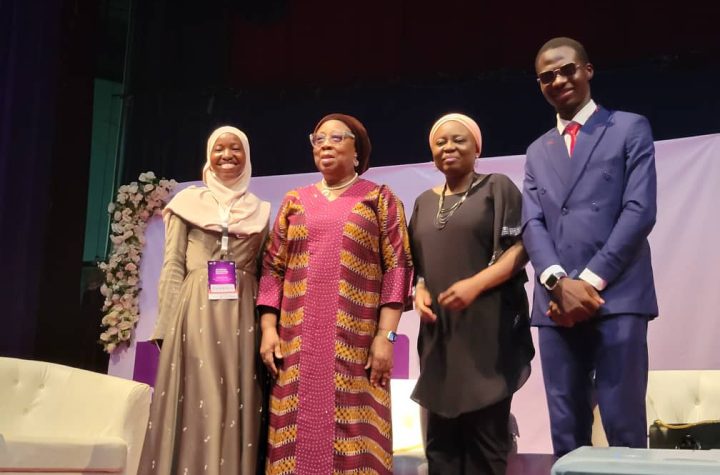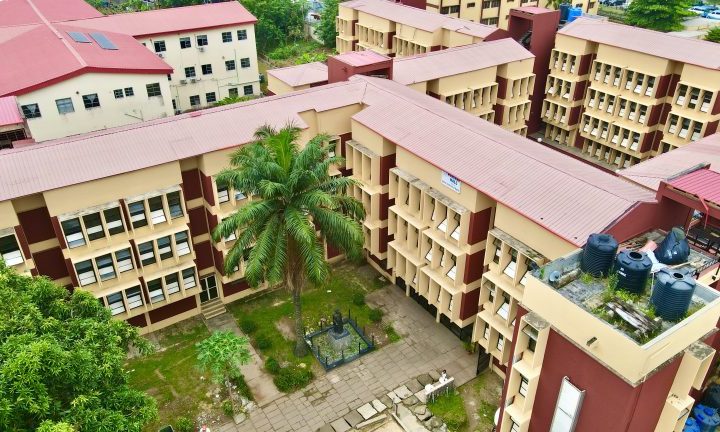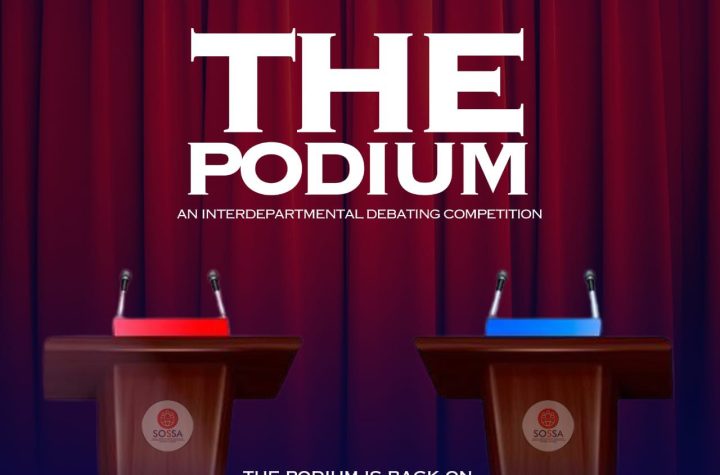
By Faith Enang and Olawunmi Abimbola

Best Graduating Student, 2024 Rhodes West Africa Finalist, and serial entrepreneur. In this interview with Unilag Sun reporters, Faith Enang and Olawunmi Abimbola, Muhammadulfatiu Adepeju narrates his story.
𝗣𝗹𝗲𝗮𝘀𝗲 𝗶𝗻𝘁𝗿𝗼𝗱𝘂𝗰𝗲 𝘆𝗼𝘂𝗿𝘀𝗲𝗹𝗳. 𝗬𝗼𝘂𝗿 𝗻𝗮𝗺𝗲, 𝘀𝗲𝗾𝘂𝗲𝗻𝗰𝗲 𝗮𝗻𝗱 𝗽𝗿𝗼𝗷𝗲𝗰𝘁 𝘁𝗼𝗽𝗶𝗰.
My name is Muhammadulfatiu Adepeju. In many quarters, I am known as ABYS, which is an acronym for what you could call my descriptor—an Awesome Bespectacled Young Scholar. I am a 2024 Rhodes Scholarship finalist for West Africa and the Department of Mass Communication’s Best Graduating Student at today’s 54th Convocation Ceremonies of the University of Lagos.
I had a diverse experience as an undergraduate, but I majored in digital communications. I love to explore social subjects about the Internet and technology. In my final year, I ran a dissertation titled: “What is ‘social’ in social networks?” which weighed the social gains of social networks such as Facebook, Instagram, and Twitter by their social costs.
𝗗𝗶𝗱 𝘆𝗼𝘂 𝗽𝗮𝗿𝘁𝗶𝗰𝗶𝗽𝗮𝘁𝗲 𝗶𝗻 𝗮𝗻𝘆 𝗲𝘅𝘁𝗿𝗮𝗰𝘂𝗿𝗿𝗶𝗰𝘂𝗹𝗮𝗿 𝗮𝗰𝘁𝗶𝘃𝗶𝘁𝗶𝗲𝘀 𝗮𝗻𝗱 if 𝘆𝗲𝘀, 𝘄𝗼𝘂𝗹𝗱 𝘆𝗼𝘂 𝘀𝗮𝘆 𝘁𝗵𝗲𝘆 𝗰𝗼𝗻𝘁𝗿𝗶𝗯𝘂𝘁𝗲𝗱 𝘁𝗼 𝘆𝗼𝘂𝗿 𝗼𝘃𝗲𝗿𝗮𝗹𝗹 𝘀𝘂𝗰𝗰𝗲𝘀𝘀 𝗮𝗻𝗱 𝗽𝗲𝗿𝗳𝗼𝗿𝗺𝗮𝗻𝗰𝗲?
Absolutely! While here, I popularised the mantra, “Be smart, not bookish,” fanned by my belief and conviction that education should be total and comprehensive. For instance, outside of academics, I was actively involved in sports, notably Karate. You might have even seen me before on one of those evenings I trained at the sports complex dressed in my white Gi and coloured belt. I became a Karate athlete long before I got into the university, and I enjoyed it even more during my studentship here.
Also, I was an entrepreneur. While I was here, I started myLearning Buddy (MLB), which won the UMCAA Prize in 2021. Driven by the desire to make learning more fun, collaborative, and effective, I started a rudimentary version of the idea in my third year with my classmates. Now, it is a registered Edtech startup, although still incipient.
Similarly, I was a contributing member of the Muslim Students’ Society of Nigeria and played some leadership roles within the group during the years I was here. I was the Ameer (Coordinator) of the Muslims in the Faculty of Social Sciences for the 2020/2021 academic year, and I guess I didn’t do badly because I was named the Best Faculty Coordinator for that year.
Perhaps I should add that I did all these out-of-classroom activities while juggling studies and work. And, as you would imagine, they were very helpful. Through them, I built social and professional skills that the classroom would not teach, which greatly elevated my profile and made me industry-ready.
𝗪𝗵𝗮𝘁 𝘀𝘁𝗿𝗮𝘁𝗲𝗴𝗶𝗲𝘀/𝗵𝗮𝗯𝗶𝘁𝘀 𝗱𝗶𝗱 𝘆𝗼𝘂 𝗶𝗻𝗰𝘂𝗹𝗰𝗮𝘁𝗲 𝘁𝗼 𝗮𝗰𝗵𝗶𝗲𝘃𝗲 𝘁𝗵𝗶𝘀 𝗵𝘂𝗴𝗲 𝗮𝗰𝗮𝗱𝗲𝗺𝗶𝗰 𝘀𝘂𝗰𝗰𝗲𝘀𝘀?
Before the habits and strategies, there is the culture. My personal philosophy is, “Be excellent!” For all I do, academics or not, that’s my North Star. I lead with this because an individual cannot become what he doesn’t believe in. It is upon this conviction that habits can ride.
That said, my academic feat had at its base three solid strategies: Individuation, Active learning, and a Character of “No Gree for Anybody.”
First, I treated every part of my degree programme as an individual whole, so accommodating mediocrity was impossible. I would treat every assignment like it was all that would be used to determine my grade for its respective course. I would treat my class tests like final examinations. I would treat class projects like they were definitive. With that strategy, I treated everything with the utmost care and importance. There was nothing like, “I can play with this assignment. I will make up in the next one.” Every item was a separate whole; that was how I achieved a first-class GPA across all eight semesters I spent.
Second, I encouraged myself to learn through different means rather than just read and absorb. I think it is important for anyone in social sciences or humanities always to interrogate knowledge. That’s the way to know truly. I would engage in class discussions, lead projects, form study groups, teach colleagues, and conduct private experiments. I wasn’t just receiving, I was actively creating, too, and that helped broaden my knowledge.
Three, due to the previous point strategy (active learning), I always had a more solid attempt at my assignments, tests, or exams. My coursemates are my witnesses when I say that I deal with course assessments (assignments, tests, and exams) like they were more than what they were. I wasn’t ‘gree-ing’ for anybody. There is a way I have to write an introduction for every response. There is a way I cite examples. There is a way I link my response to something not directly asked but related. I remember one of my professors looking for me after he marked my exam script in Year 4. He didn’t know me by my full name, so he didn’t know who the student was. He told a friend of mine, the department president at the time, to find the owner of my name. I still hold very dearly what he said when I saw him in his office.
So, there you go—my Merlin spell!
𝗪𝗮𝘀 𝘁𝗵𝗲𝗿𝗲 𝗮𝗻𝘆 𝗽𝗼𝗶𝗻𝘁 𝗱𝘂𝗿𝗶𝗻𝗴 𝘆𝗼𝘂𝗿 𝘀𝘁𝗮𝘆 𝗮𝘀 𝗮 𝘀𝘁𝘂𝗱𝗲𝗻𝘁 𝘁𝗵𝗮𝘁 𝘆𝗼𝘂 𝗸𝗻𝗲𝘄 𝘆𝗼𝘂 𝗺𝗶𝗴𝗵𝘁 𝗷𝘂𝘀𝘁 𝗯𝗲 𝗮𝗯𝗹𝗲 𝘁𝗼 𝗮𝗰𝗵𝗶𝗲𝘃𝗲 𝘁𝗵𝗶𝘀 𝗳𝗲𝗮𝘁 𝗼𝗳 𝗲𝗺𝗲𝗿𝗴𝗶𝗻𝗴 𝘁𝗵𝗲 𝗕𝗚𝗦?
When I saw my first semester results in my first year, I thought I could be my set’s best graduating student. But it was mere hope. I had no certainty. It would be tomfoolery to think that leading a class of over 200 in the first of eight semesters would mean graduating top of the class. But, of course, the thought of it being possible always energised me.
You know, even in my final year, I still prohibited some junior colleagues from already addressing me by the title. Yes, I’m a highly optimistic person. But I’m not one to count his chickens before they hatch.
𝗖𝗮𝗻 𝘆𝗼𝘂 𝘀𝗵𝗮𝗿𝗲 𝗮𝗻𝘆 𝗺𝗲𝗺𝗼𝗿𝗮𝗯𝗹𝗲 𝗲𝘅𝗽𝗲𝗿𝗶𝗲𝗻𝗰𝗲 𝘁𝗵𝗮𝘁 𝗱𝗲𝗳𝗶𝗻𝗲𝘀 𝘆𝗼𝘂𝗿 𝗮𝗰𝗮𝗱𝗲𝗺𝗶𝗰 𝗷𝗼𝘂𝗿𝗻𝗲𝘆?
As an undergraduate, I had many memorable experiences at this University, the varsity of first choice. For three years, I was an NNPC/Total Merit Scholarship Awardee, and I can tell you free of charge that there’s no money sweeter to enjoy than scholarship money. I also received the Abdulkabir Aliu Foundation Scholarship Funds for three out of four years. Yes, those were memorable!
But beyond my accomplishments, what I would truly treasure most are the chances to make a difference I embraced while I was here. I am passionate about building people and sustainable systems and will miss the opportunities for impact that always came to me as a student here.
𝗝𝘂𝘀𝘁 𝗮 𝗳𝗲𝘄 𝗺𝗼𝗻𝘁𝗵𝘀 𝗮𝗴𝗼, 𝘆𝗼𝘂 𝘄𝗲𝗿𝗲 𝗮𝗻𝗻𝗼𝘂𝗻𝗰𝗲𝗱 𝘄𝗶𝘁𝗵 𝟭𝟯 𝗼𝘁𝗵𝗲𝗿𝘀 𝗮𝘀 𝟮𝟬𝟮𝟰 𝗥𝗵𝗼𝗱𝗲𝘀 𝗳𝗶𝗻𝗮𝗹𝗶𝘀𝘁𝘀 𝗳𝗼𝗿 𝗪𝗲𝘀𝘁 𝗔𝗳𝗿𝗶𝗰𝗮. 𝗪𝗵𝗮𝘁’𝘀 𝘁𝗵𝗲 𝗥𝗵𝗼𝗱𝗲𝘀 𝗦𝗰𝗵𝗼𝗹𝗮𝗿𝘀𝗵𝗶𝗽 𝗮𝗻𝗱 𝗵𝗼𝘄 𝗱𝗶𝗱 𝘁𝗵𝗮𝘁 𝗵𝗮𝗽𝗽𝗲𝗻?
Founded in 1902, the Rhodes Scholarship, revered as the world’s oldest and most prestigious international programme, empowers exceptional young minds from across the globe to pursue full-time postgraduate studies at the University of Oxford.
I first learnt about it in 2021 while preparing for my post-graduate options. I was in my third year at that time. I watched the interview of one of the two West African scholars chosen for the year and studied the eligibility criteria. When I was done, I decided to apply for the scholarship in 2022 once I finished my undergraduate programme. I sent a LinkedIn connection request to the 2021 scholar whose interview I watched, and we briefly discussed my odds.
Due to the long strike in 2022, I couldn’t complete my programme until August 2023. After my final exams, I quickly compiled the documents I would need for my Rhodes application. I needed a personal and academic statement, a CV, a recent transcript, an international passport, and at least four recommendation letters. A few minutes before the deadline on August 28, I submitted my application with not 4 but 6 recommendation letters.
The Rhodes Scholarship demands more than just academic brilliance. It requires demonstrating community leadership, impeccable character, and developed potential demonstrated through artistic pursuits or sports. With that understanding, I chose referees who could separately remark about my academic, professional, and extracurricular abilities.
After a series of assessments, I got an email that I was in the top 25 out of over 3000. I was booked for a virtual interview a few days after that email. I did the interview, and after about five days, I received another email announcing me as a finalist. Surreal!
𝗟𝗼𝗼𝗸𝗶𝗻𝗴 𝗯𝗮𝗰𝗸 𝘄𝗼𝘂𝗹𝗱 𝘆𝗼𝘂 𝘀𝗮𝘆 𝘁𝗵𝗲𝗿𝗲’𝘀 𝗮𝗻𝘆𝘁𝗵𝗶𝗻𝗴 𝘆𝗼𝘂 𝗰𝗼𝘂𝗹𝗱 𝗵𝗮𝘃𝗲 𝗱𝗼𝗻𝗲 𝗱𝗶𝗳𝗳𝗲𝗿𝗲𝗻𝘁𝗹𝘆 𝗮𝘀 𝗮𝗻 𝘂𝗻𝗱𝗲𝗿𝗴𝗿𝗮𝗱𝘂𝗮𝘁𝗲?
I think I could have tried to have a richer experience of popular food spots on campus before I left. I cannot remember ever buying Korede spag, for instance. Salado, maybe once. Shop 10? Ewa Agonyin Palace? The Shawarmas and milkshakes? Rarely or never. I always stayed at Cafeteria 2001 or the food shops in the hostels. Looking back, I could have spent some of my scholarship funds on food.
𝗟𝗼𝗼𝗸𝗶𝗻𝗴 𝗮𝗵𝗲𝗮𝗱 𝘄𝗵𝗮𝘁 𝗮𝗿𝗲 𝘆𝗼𝘂𝗿 𝗴𝗼𝗮𝗹𝘀 𝗮𝗻𝗱 𝗮𝘀𝗽𝗶𝗿𝗮𝘁𝗶𝗼𝗻𝘀 𝗺𝗼𝘃𝗶𝗻𝗴 𝗳𝗼𝗿𝘄𝗮𝗿𝗱?
I currently work as a contract digital communications analyst covering West Africa for a global chemical conglomerate. Over the next decade, God willing, my immediate focus will be on deepening my academic and professional foundation in communication, AI and technology ethics, and digital society. I hope to start with the MSc in Social Science of the Internet program at the University of Oxford, followed by a DPhil in Information, Communication, and Social Sciences at the same institution. These programmes will fulfil my aspiration to become a technology ethicist supporting the development of humane technology and AI in Africa.
Also, you can expect to find me in the African Edtech ecosystem in the next few years, either with an improved scalable iteration of myLearning Buddy or a totally new solution, God willing.
To conclude, I’m drawn to public policy and governance as well. I believe I could do a thing or two in the public sector in the coming years.





More Stories
Podium Maiden Edition Ends with Mass Communication Win
Showcasing the charming spots in UNILAG
FG needs a win-win streak to end ASUU strikes